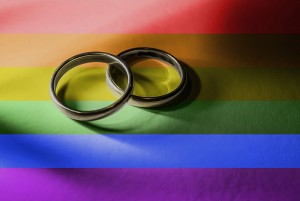 Deny other people rights to (your concept of) the afterlife all you want.
Deny other people rights to (your concept of) the afterlife all you want.
But you can’t deny legally decided rights in this life and get away with it.
Now that marriage laws protect everyone in the U.S., regardless of gender, the opposition has shifted the force of its energy to what they call protecting religious liberty. It is very important to note that what these folks want to protect is their freedom to discriminate, deny services, and impose ideology on others as they defy federal law.
As Rachel Held Evans put it:
“We’ve obscured the gospel when the ‘right to refuse’ service has become a more widely-known Christian value than the impulse to give it.”
Or, as fellow Patheos blogger Benjamin Dixon implores, “Please stop with the Christian persecution complex. You’re embarassing the faith.”
I wish we could frame religious freedom positively, with a movement toward inclusion, expansion, and welcome. I wish grace was the guiding theological idea for these discussions. I wish we could celebrate an idea of God that is bigger and better than each of us in our often-petty smallness. I wish that our different views of God added up to a better whole. As Evans notes, the Obergefell decision should actually be seen as
“a victory for religious freedom in the sense that people whose religion supports and encourages same-sex unions will no longer be prohibited from practicing that important religious value simply because some of their neighbors hold a different view.”
Instead, we are seeing the continuation of the rhetoric about religious freedom that shaped the Hobby Lobby case argued before the Supreme Court in 2014. This religious freedom is about denial, discrimination, and devaluing.
It’s all about the freedom to NOT serve one’s neighbor.
No one should have the right to do that. (And it’s far from a Christian value.)
Despite fearmongering and executive orders, no clergyperson or house of worship is going to be forced to act contrary to their theology as they carry out their religious functions. If they were, we’d have had to see female clergy in every church in the land long ago. (If only …)
But if you run a business that’s open to the public, you have to serve the public. Even if you don’t like the public. Even if you don’t think that your customer is getting into your heaven. It’s none of your business anyway.
As Garrett Epps put it in a very thorough article on the history, purpose, and limits of religious freedom, public accommodation laws, and civil rights protections earlier this year:
“The one thing we can’t have is a rule—unwritten or explicit—that says discrimination is justified if the person discriminating really, really objects to the excluded group. Whether explained in religious terms or not, that undermines the entire idea of civil rights.”
A central problem here is that the people who now want additional “protection” (from sharing civil rights?) already have power and status by virtue of Christian privilege. They want to extend their power and freedom beyond their own actual religious practice and worship to impose views on someone else’s public life. Evans suggests that “a spirit of fear and entitlement does more to obscure the gospel than elucidate it” and identifies several realities that Christians claiming persecution completely miss.
And this is exactly the problem with privilege. It’s invisible. The privileged are actively encouraged to not-see it. And when we don’t see our own privileges (based on race, gender, religion, ability, and so on), we are blind to the suffering of others. Most dangerously, “compassion and advocacy are rooted in self-interest alone and Christian privilege is guarded ruthlessly, even if it comes at the expense of others.”
So if you already have Christian privilege, you have plenty of religious freedom.
Perhaps, in having the ability to deny, discriminate, and devalue, you have too much.
Image via wikimedia commons.
















